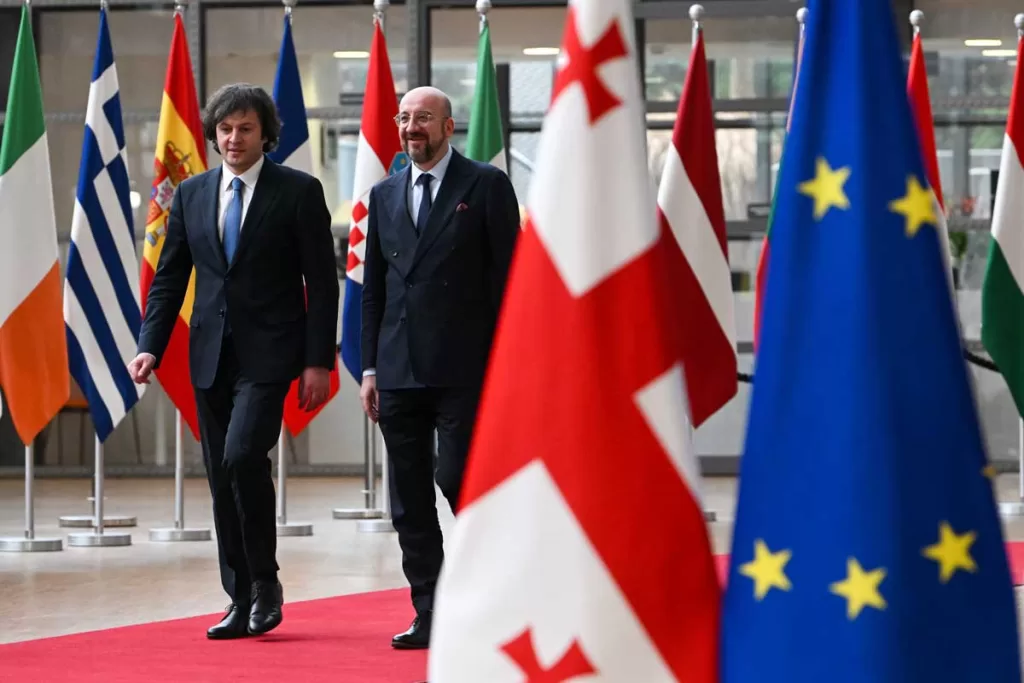Georgian government is not exactly clear on the path towards EU membership, even if Georgia got the candidacy last December, thanks mostly to his President. Which is why the EU should start a gradual membership of Georgia sooner than later, even with regions still occupied by Russia and even if the next elections in Autumn will see the Georgian Dream party overwhelmingly winning. The Georgian Dream parliamentary majority recently proposed recently a new anti-LGBTQ+ constitutional law, and this would not help the country towards EU membership. But besides putting fundamentals such as rule of law and the protection of human rights, the EU membership is critical to protect democracy and sovereignty of EU members, against foreign interference.
The country was granted candidate status as a testament to its people democratic desires and resilience, in particular after protesting against the foreign agent law that the government wanted to pass, and on the understanding that it would have take the relevant steps as set out in the EU Commission report. The report said that Georgia positively put in place already legislation to protect gender equality and fight violence against women, and made overall progress on reforms related to public administration, public procurement and the economy. But it needed to get more serious about its fight against disinformation and foreign interference, tackle political polarization, ensure free and fair elections, and carry out judicial reforms. These are the things that the EU should focus on, more than issues of changing gender or same-sex couples adopting children.
The recent communication by the EU Commission, remembering the 2020 revised enlargement methodology for ‘gradual integration’ offers a compelling framework, providing partial integration into EU policies as a precursor to full membership. Such an approach could safeguard Georgian people, demonstrating the EU’s unwavering commitment to sovereignty and democracy, against further encroachments by pro-Kremlin factions in Russian occupied regions. For instance, recently Abkhazia has implemented ‘foreign agents’ laws to suppress dissenting voices and the head of South Ossetia’s parliament is actually ‘discussing’ with Russia becoming part of Russian Federation.
In 2008, just one year after Putin’s ominous speech at the Munich conference foreshadowed events, Georgia became the first post-WWII free and democratic European nation to face invasion by Putin’s forces of two regions, Abkhazia and South Ossetia, This incursion occurred shortly after Georgia, akin to Ukraine, had embarked on the path towards NATO membership, but these territories had already been de facto breakaway regions since the 1990s due to civil conflicts. Some contend that unresolved territorial disputes may impede Georgia’s EU accession, echoing concerns for Moldova and Ukraine. Yet, these nations grappled with similar challenges of incomplete territorial control since the beginning of their independence, like Azerbaijan and others countries born from the Soviet Union’s dissolution. In fact, securing EU, and in future NATO membership for Georgia, akin to Ukraine, holds significance in demonstrating that nations can integrate into the Euro-Atlantic community despite facing territorial occupations. Cyprus serves as a notable precedent, as it joined the EU in 2004 despite enduring a similar situation with Turkish forces occupying a portion of the island. This underscores the principle that sovereign status remains intact even in the presence of such challenges, emphasizing the resilience and determination of nations aspiring to be part of the Euro-Atlantic family.
Accelerating Georgia’s EU accession would not only benefit the nation itself but also herald a transformative shift in the Southern Caucasus. Recent diplomatic engagements, including the recent NATO Secretary General’s visit, underscore the region’s evolving geopolitical landscape and Russia’s waning influence. The timing of Stoltenberg’s symbolic visit couldn’t have been more crucial actually. It coincides with a shifting dynamic in the region’s power balance. Armenia’s pivot towards the West, evidenced by its suspension of the CSTO agreement with Russia and even recent consideration of EU membership, reflects this evolving landscape, as well as Georgia’s recent attainment of EU candidacy and its future NATO membership prospects. Azerbaijan’s impending return of Russian troops still stationed in the country following the 2020 Karabakh war ceasefire, highlight the region’s geopolitical flux too. Azerbaijan’s actually remains now the closest allies of Russia in the region, because of the agreement signed in Moscow just two days before Putin invaded Ukraine in 2022.
A possible membership in the EU, would offer Georgia not just economic and political benefits but crucial security assurances, even if differently from that of NATO, inside an increasingly important EU Common Security and Defense Policy and Defense Industrial Strategy. This is particularly pertinent in countering hybrid warfare tactics such as propaganda, energy manipulation, and cyber threats, through collective defense mechanisms, in particular in a region where Putin still wants to cast its sphere of influence. As Georgia aspires to transition from the Eastern Partnership to full EU membership, the significance of these security provisions cannot be overstated.
To make the case for a speed up towards a EU membership for Georgia is important now more than ever, especially if the country will have a new Georgian Dream strong government after the parliament elections in October. Starting a gradual integration within the EU would not only benefit Gorgia but would exemplify the Union’s adaptability and reinforce its solidarity with Eastern European regions, first of all the Southern Caucasus, where Russian influence persists. By extending a lifeline to nations grappling with external pressures, the EU could reaffirm its foundational principles while shaping the contours of a more resilient and inclusive Europe.
